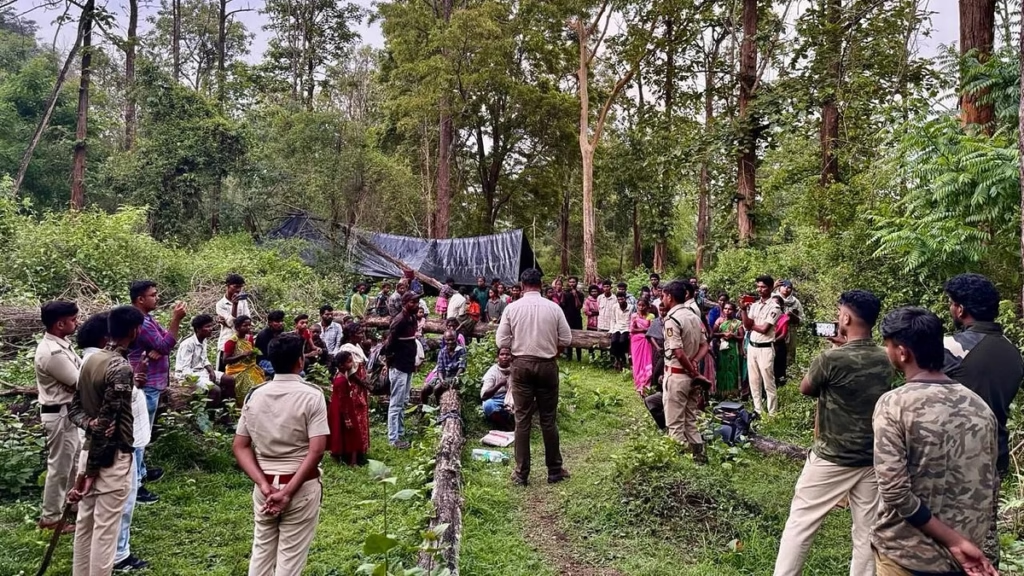
Source: https://www.downtoearth.org.in/amp/story/forests/situation-in-nagarhole-tense-as-evicted-jenu-kuruba-tribals-attempt-to-return-to-their-land-reclaim-forest-rights
Relevance: Paper-2
A Struggle for Recognition, Not Charity
In the forests of Nagarhole in Karnataka, an ongoing battle between the Jenu Kuruba tribe and the Forest Department has once again come into sharp focus. The Jenu Kurubas—designated as a Particularly Vulnerable Tribal Group (PVTG)—have lived in deep connection with the forest for generations. Known as “honey collectors,” they depend on the forest not just for livelihood but as a sacred landscape that defines their identity. Their recent attempt to return to their ancestral lands has ignited tensions and sparked a larger conversation about forest rights, displacement, and legal recognition.
Background: Forced Eviction and Legal Roadblocks
In 1985-86, the Jenu Kuruba community was evicted from their homes when Nagarhole was declared a wildlife sanctuary. Many were compelled to work in coffee plantations, far removed from their traditional ways of life. The Scheduled Tribes and Other Traditional Forest Dwellers (Recognition of Forest Rights) Act, 2006—popularly known as the Forest Rights Act (FRA)—brought a ray of hope by legally recognizing the rights of tribal communities over forest land and resources. The Jenu Kurubas applied for their rights in 2009, but their claims have repeatedly been rejected, mainly on the grounds that they no longer reside on the land—a direct result of their forced eviction decades ago.
FRA: Recognition of Existing Rights, Not a New Grant
Rajan, a member of Community Networks Against Protected Areas (CNAPA), emphasized that the FRA does not grant new rights but affirms the pre-existing rights of forest dwellers. According to him, the law acknowledges that people like the Jenu Kuruba did not leave voluntarily but were displaced. FRA also permits recognition of rights through evidence such as sacred groves, agricultural practices, and natural landmarks—evidence the community has consistently tried to present.
Renewed Push and Delayed Justice
Inspired by the 2019 interim Supreme Court order concerning rejected FRA claims, the Jenu Kurubas reapplied for recognition. A joint survey was conducted in September 2024 by revenue and forest department officials, but no progress followed. Frustrated by bureaucratic delays, the community announced on May 3, 2025, that they would reclaim their ancestral lands on May 5.
They submitted prior notice to the forest department, asserting that the FRA legitimizes their right to return and does not violate any conservation law. However, on May 6, about 150 members of the tribe were forcibly removed by authorities.
Legal and Administrative Pushback
On May 8, the Assistant Conservator of Forests issued a letter stating that a temporary injunction—effective until July 23, 2025—prohibits any activities related to FRA implementation within Nagarhole Tiger Reserve. This includes joint surveys, sub-divisional and divisional committee meetings. The letter further directed all Adivasi individuals who had re-entered the forest to vacate immediately, with assurance that recognition processes would resume only after the injunction is lifted.
National Conservation vs Indigenous Rights
Pranab Doley, CNAPA leader and member of the Missing Indigenous community in Kaziranga, Assam, accused the National Tiger Conservation Authority (NTCA) of systematically violating Adivasi rights. He criticized the use of conservation as a tool to criminalize and dehumanize indigenous forest dwellers, citing widespread harassment, false cases, and denial of dignity and basic human rights.


